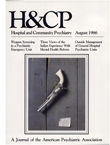Using Electroconvulsive Therapy for Patients With Neurological Disease
Abstract
In the United States electroconvulsive therapy (ECT) is not commonly used with patients who have conditions affecting the structure or function of the brain. Many clinicians may be unaware, therefore, that ECT has been used safely to treat patients with combined major depression and central nervous system disorders; patients with organic mental syndromes, particularly delirium; and patients who have psychiatric disorders that mimic or are distorted by brain disease. The author discusses the successful use of ECT with such patients as well as potential dangers of the treatment through a review of worldwide experience with ECT and presentation of case examples. He concludes by suggesting possible mechanisms through which ECT may benefit both depression and organic mental syndromes.
Access content
To read the fulltext, please use one of the options below to sign in or purchase access.- Personal login
- Institutional Login
- Sign in via OpenAthens
- Register for access
-
Please login/register if you wish to pair your device and check access availability.
Not a subscriber?
PsychiatryOnline subscription options offer access to the DSM-5 library, books, journals, CME, and patient resources. This all-in-one virtual library provides psychiatrists and mental health professionals with key resources for diagnosis, treatment, research, and professional development.
Need more help? PsychiatryOnline Customer Service may be reached by emailing [email protected] or by calling 800-368-5777 (in the U.S.) or 703-907-7322 (outside the U.S.).



